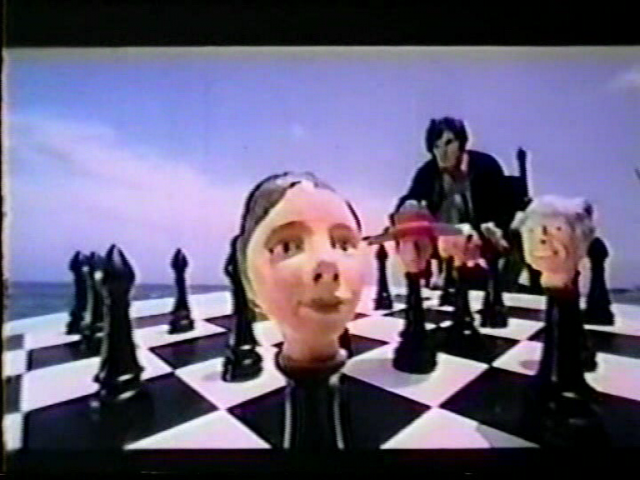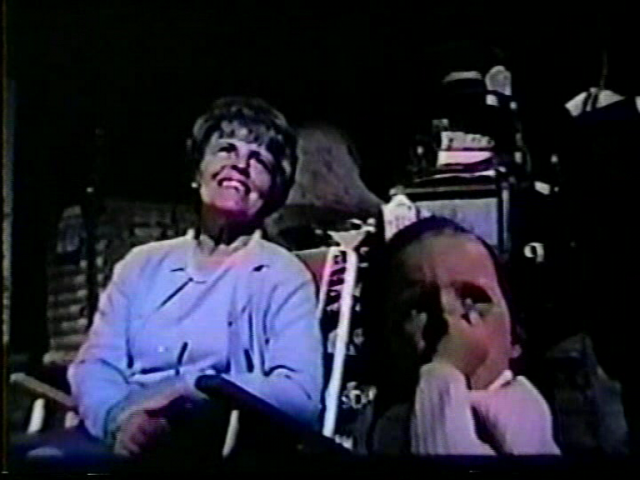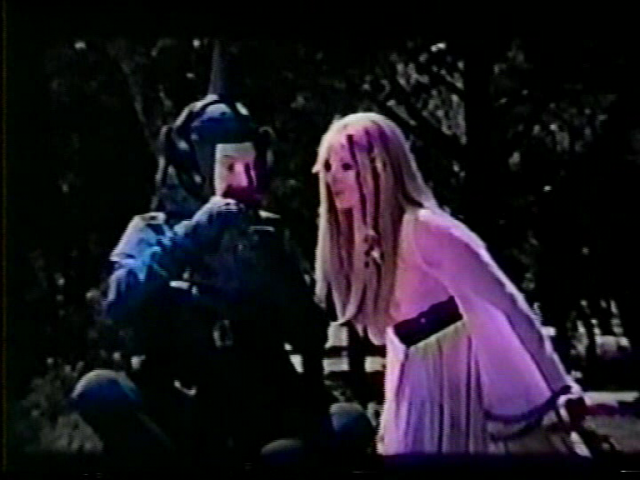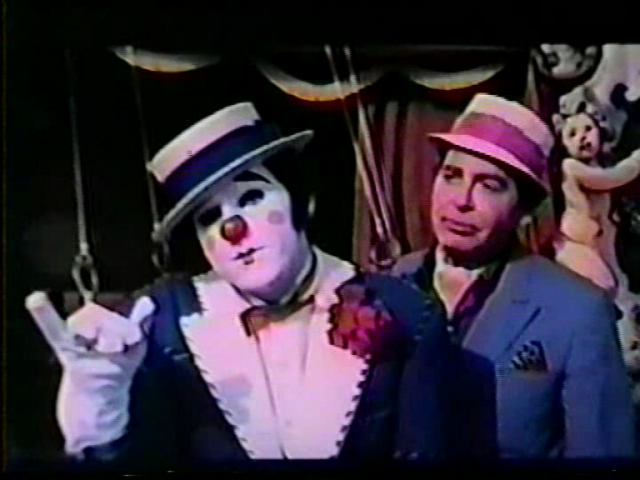|
Genres, Themes, Actors, and Directors:
- Fantasy
- Flashback Films
- Joan Collins Films
- Musicals
- Womanizers
Review:
Pop star Anthony Newley wrote, produced, directed, scored, and starred in this self-absorbed but surreally fascinating pseudo-autobiographical musical about a performer named Heironymus Merkin who beds and/or weds countless women while skyrocketing to fame. Largely considered a failure upon its release, it has since gained cult status, thanks in no small part to its intriguingly unwieldy title. CHMEFMHAFH is ultimately a hit-or-miss affair, but is so creatively conceived and executed that it’s difficult not to find oneself at the very least impressed by the audacity of Newley’s vision (and wondering what other similarly unhinged spectacles might emerge if all “artists” were given free reign to create a movie about their lives…) There’s ultimately too much going on in CHMEFMHAFH — rated X for some nudity and simulated sex but quite tame by today’s standards — to explain or describe it all in one review; it’s the kind of film that must be seen to be appreciated.
The fragmented, fantasy-laden storyline (which possesses distinct echoes of Fellini) is centered around Merkin screening a film about his life to his doting mother (a delightfully game Patricia Hayes) and two young children, and to an audience of critics (Victor Spinetti, Rosalind Knight, and Ronald Radd), crew members, and other spectators. Parts of the film take place on a deserted beachfront, where Newley acts out scenes from his childhood (in a highly creative and successful gesture, he plays his child-self as a limp marionette) as well as both his marriages. Passages flow freely from one setting to the other, with little regard for continuity or logic, but (to Newley’s credit) things never become confusing, only increasingly surreal.
Newley fills his movie to the brim with theatricality and carefully rendered artifice, all in the service of the old bromide that “life’s a stage” and we’re players on it. All the female characters, for instance, are given lewd and/or alliterative names (Polyester Poontang, Filigree Fondle, Mercy Humppe), while others possess equally theatrical monikers (Fat Writer, Skinny Writer, Sharpnose, Red Cardinal). Milton Berle shows up as a “devil on the shoulder” named Eddie Goodtime Filth (he sets Merkin on a lifetime road towards womanizing), while Jewish comedian George Jessel as The Presence (death?) inexplicably comes and goes, spouting stand-up jokes to a flummoxed Merkin. Fortunately, even when Newley is at his most self-aggrandizing (he shows his alter-ego bedding literally countless women, who line up behind his bed on the beach), he retains a sense of humor and perspective about it all — most notably in the presence of his critics, who he allows to provide a welcome outside perspective on the entire endeavor.
Newley’s score, however, is a major disappointment; his forgettable songs range from maudlin (“I’m all I need; if I’ve got me, I’ve got rainbows”) to inane. The songs should have simply been scrapped, thus cutting the film’s viewing time down and streamlining the script. The one exception is Newley’s outrageously hilarious ditty “Once Upon a Time”, about a princess named Trampolena Whambang (Yolanda) and her donkey lover; this song alone is worth several viewings. (I love how Merkin finally sends his kids away during the screening of this sequence — it’s the only one he considers too truly outrageous for little eyes and ears.) If only the rest of the film’s songs came close to matching its sense of wit and surreality…
Note: Ironically, Mercy Humppe herself (Playmate of the Year Connie Kreski) plays a remarkably small part in the film; she shows up in one gauzy sequence as Merkin’s “dream nymph”, but only really has a few scenes after this, and never seriously disrupts Merkin’s life in any way.
Redeeming Qualities and Moments:
- Weirdly audacious and surreal imagery


- Patricia Hayes as “Grandma”

- Victor Spinetti, Rosalind Knight, and Ronald Radd as three vicious critics (pictured below as witches and wizards in the song “Once Upon a Time”)

- The hilarious “Once Upon a Time” song

- Newley’s boldly satirical script

Must See?
Yes, simply as a most unusual cult flick. Listed as a Cult Movie and a Personal Recommendation in the back of Peary’s book.
Categories
Links:
|
One thought on “Can Heironymus Merkin Ever Forget Mercy Humppe and Find True Happiness? (1969)”
First viewing. A must – for its audacity alone…
– however – is this a film only a mother could love?
Specifically, Anthony Newley’s mother?
And, even then, with reservations?
…were she to think of them?
Is this a film we’re likely to see a pristine print of in the near future, available via Netflix?
Not bloody likely.
Distributor Universal Pictures must have this one at the root, holding up the pyramid.
FFs are going to have to really make an effort to track this one down…seeing as it is practically doomed to obscurity.
But is that because it’s that bad? No. Just the kind of thing that would never survive a number crunch. Few (aside from Broadway cultists) are going to recall who Anthony Newley was, and few outside of ‘Dynasty’ enthusiasts are going to care what Joan Collins is doing here.
[I recall seeing a Collins interview in which she spoke unfavorably about this film – about how she had no clue as to the unflattering light it was going to shed on her relationship with Newley. …Huh?!]
For ffs who manage to find it, its main guilty pleasure will be in the initial viewing (which is potent). It will most likely not hold up as well during subsequent viewings. But its initial power will be striking enough.
I’m not really that bothered by the film score – even if it doesn’t achieve anything near the brilliance of the stage work Newley delivered with Leslie Bricusse (‘Stop The World – I Want To Get Off’, ‘The Roar of the Greasepaint – The Smell of the Crowd’). The songs aren’t all that memorable but they serve while the film is running. ‘Once Upon a Time’ is, indeed, among the best. And ‘I’m All I Need’ finds Newley oddly ‘inhabited’ by Liza Minnelli.
The film begs the question…: Is this something better left for the ears of a psychiatrist? Will the general public care? Probably not. But hardcore ffs will still want to see it. It’s too unique…for its own good.
I esp. like how Newley employed the comic likes of Milton Berle (who can say he didn’t take risks in his limited film career?), George Jessel and Stubby Kaye. Newley was well aware of the vaudeville aspect of his material.
cf: several Fellini films aside…’Stardust Memories’ and ‘All That Jazz’, at least.